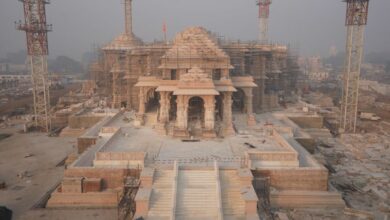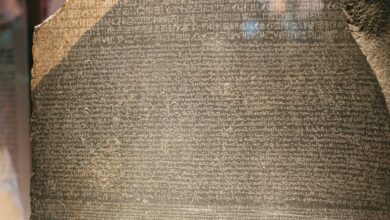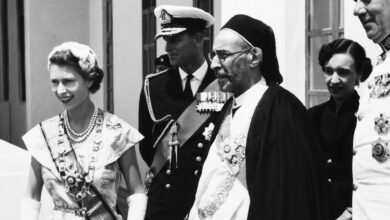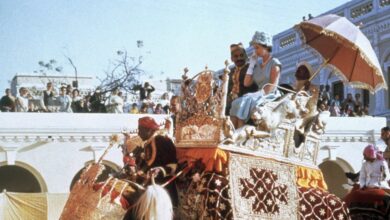Today marks the 105th anniversary of the Dinshawai Incident, the dramatic event that any Egyptian school child will dutifully identify as the trigger for the explosion of anti-colonial nationalism in Egypt. The basic narrative of the Incident has been well rehearsed; leaf through any official history textbook (or most newspapers published today) and you’ll likely find some version of the following:
On the morning of 13 June, 1906 five uniformed British soldiers stationed in the province of Menoufiya decided to take a hunting excursion to the village of Dinshawai, reputedly a good spot for shooting pigeons. The birds in question had been raised by the villagers of Dinshawai, who quickly took issue with what they considered a brazen attack on their property. As they attempted to disarm the soldiers, a scuffle broke out, shots were fired, and several of the villagers, including one local woman, were wounded. The villagers retaliated by beating the soldiers with staffs and attempting to detain them, but two managed to slip away. Already weakened by a concussion he had suffered in the skirmish, one of the fleeing soldiers collapsed and died of heatstroke after running for miles in the noonday heat. The other reached his camp and summoned reinforcements to free his companions.
The response of Egypt’s colonial administration was swift and ruthless. The following day, forces dispatched by the Ministry of Interior arrested 52 of the villagers in connection with what they alleged was a planned attack on the British soldiers. Rather than leave the trial to the country’s existing court system, Lord Cromer demanded that the government convene a Special Tribunal to investigate the charges and hear the case. Working under the close supervision of the British authorities, the Tribunal completed its investigations in under a week and handed down decisions for all 52 of the accused. Four were found guilty of premeditated murder and sentenced to death by hanging; two were condemned to penal servitude for life; 15 more received shorter prison terms along with public floggings.
If the basic features of this story are relatively clear, their meaning for Egyptians both then and now is not. In many official accounts the Incident in all its details appears as a representative example of the innumerable wrongs Egypt’s people endured at the hands of the British. In others, it becomes a mere stage in Egypt’s inexorable march towards full independence in 1952. Absent from most of these narratives is any real effort to explain how this particular incident became a transformative historical event. What was it about this story that so captivated and horrified audiences in both Egypt and Britain itself?
An answer to this question begins to emerge from the terse prose of a telegram cabled to the British Foreign Office on 30 June, 1906, two days after the brutal sentences against the convicted peasants had been executed. The authors, a group of Egyptian students at Oxford, offered their protest “in the name of humanity and British Justice, the mainstay of the British Empire.” Carefully enumerating the ways in which the special tribunal at Shibin El-Kom had violated the basic protections of an ordinary court, the petitioners concluded that “the accused were denied the justice of the land” and begged the Foreign Office to stay the executions.
The students’ appeal to “British justice” was no naïve act of fawning admiration. For a quarter century, Egypt’s colonial administrators had sought to defend their presence in those very terms. British officials, they argued, would bring Egypt’s people the justice that generations of decadent and despotic khedives had withheld. And as evidence of that commitment to universal justice, they pointed proudly to the novel system of modern, secular courts they created in the earliest years of the occupation.
What Dinshawai revealed in painful detail was how colonial rule depended by its very nature on a systematic elaboration of exceptions to this ideal of universal justice. The Special Tribunal that tried the peasants of Dinshawai was not conjured out of whole cloth in the moment. Rather, it drew its authority from a law, promulgated by the Egyptian government in 1895, granting the British Consul-General the right to convene such a tribunal in cases of aggression against the army of occupation. And whereas decades of legal reform had dramatically curtailed the range of sentences Egypt’s ordinary courts could mete out, such special courts were, by law, unlimited in the range of punishments they might inflict. The polite language of the telegram, then, contained a highly charged accusation of hypocrisy.
While critics in both Egypt and England railed against the Incident as an “atrocity of justice,” Lord Cromer and his allies in London sought to recast the very outrage the Incident had unleashed as a threat to public security. Claiming that rampant “unrest” and “pan-Islamic fanaticism” might throw Egypt into a state of chaos, they demanded a rapid expansion of the very extra-judicial powers at issue in the public outcry over Dinshawai. And indeed, in the years after 1906, the British rapidly set about imposing an array of new coercive measures – mostly notably press censorship and police surveillance of “suspicious persons” – on an Egyptian public that increasingly saw constitutionalism and national independence as the best means of protecting justice from the travesties of colonial rule.
The uncanny echoes between this situation and the more recent past were not lost on critics of the Mubarak regime. One year ago, a few brave commentators dared to portray the murder of Khaled Said as the Dinshawai Incident of our own day. In the regime’s repressive tactics – the decades of Emergency Law and the obscene proliferation of extra-judicial measures undertaken in the name of “security” – they saw the dark shadow of Egypt’s colonial past. From this vantage, nationalism was not simply about substituting native Egyptian rulers for foreigners but about meaningful liberation. And as the earliest critics of Dinshawai insisted, that project would require an end to all the exceptional forms of justice that had anchored colonial rule. As Egypt moves through another moment of national liberation, we would do well to ask whether that goal has yet been achieved.
Aaron Jakes is a PhD candidate in the departments of History and Middle Eastern and Islamic Studies at New York University. He is currently conducting research at the British National Archives in London for a dissertation about the agrarian policies of the Egyptian government under the British occupation.




